MercoPress. South Atlantic News Agency
Tag: Argentine crisis
-
Saturday, April 27th 2019 - 11:30 UTC
A week of volatility in Argentina ends with the Peso down 8.81%
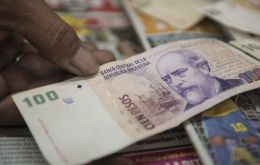
Argentina’s peso fell back on Friday afternoon to post a record low close, giving up earlier gains after a tumultuous week that saw the currency battered to its weakest ever level and local debt pummeled as anxious investors fled.
-
Saturday, April 27th 2019 - 09:59 UTC
With markets and assets falling, Argentina becomes a magnet for bargain hunters
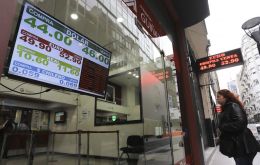
Argentine assets have tumbled so far, so fast that a few stout-hearted investors say it might be time to buy. “Find me a high-yield sovereign country with an IMF program paying so generously,” said Jean-Dominique Butikofer, the Atlanta-based head of emerging-market fixed income at Voya Investment Management, which oversees about US$ 205 billion.
-
Thursday, April 25th 2019 - 21:48 UTC
Economic collapse in Argentina worsens in a volatile day: Macri blames uncertainty
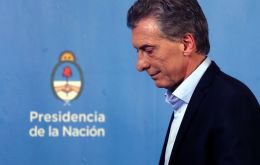
Argentina lived on Thursday another day in which the dollar rebounded and the country risk exceeded 1000 points. President Mauricio Macri criticized the “short-term” view of the markets and the Central Bank (BCRA) had to intervene by positioning the interest rate at 70% and diverting the futures market to contain the demand on the currency, preventing it from reaching the maximum accorded of 51.45 pesos.
-
Tuesday, April 23rd 2019 - 09:18 UTC
Argentina managed a quarterly primary surplus during the first quarter

Argentina ran a primary fiscal deficit of 13.037 billion pesos (US$ 305.32 million) in March, the country’s Treasury minister Nicolás Dujovne said at a press conference on Monday, though posted a first-quarter surplus of 10.347 billion pesos.
-
Thursday, March 28th 2019 - 09:39 UTC
Argentine Peso slides to an all time low and country risk climbs to almost 800 points
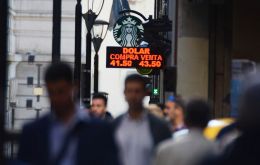
The Argentine Peso slid to all-time lows against the dollar as concerns about inflation, weak growth and October's presidential election weighed. The currency has lost 14% so far this year and the weakness raises fears of a repeat of the currency crisis of 2018 when the Peso lost half its value against the dollar.
-
Wednesday, March 27th 2019 - 08:48 UTC
Argentine financial markets jittery over October elections uncertainty

Investors in Argentina are starting to get the jitters. The gap in yield between local and U.S.-issued bonds has roughly doubled in the last month in the face of stubborn inflation and mounting peso outflows, heaping pressure on President Mauricio Macri ahead of elections later in the year.
-
Wednesday, October 17th 2018 - 09:16 UTC
Argentine industrial activity contracts 4.1% in August year-to-year

Industrial activity in Argentina dropped 4.1% in August compared to a year ago, completing a 0.8% contraction so far this year, according to a survey by the country's Industrial Union, UIA. However compared to last July industrial production was up 0.7%.
-
Saturday, September 1st 2018 - 09:27 UTC
S&P places Argentina credit ratings under review
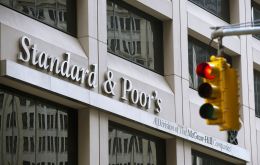
S&P said on Friday it may lower Argentina's long-term foreign currency rating from its current B+ grade, which is four notches below investment grade -- and on par with Turkey, Greece and Fiji. The ratings company cited the risk of worsening creditworthiness and exchange rate volatility as potential threats to the economic adjustment measures undertaken by Mauricio Macri’s administration.
